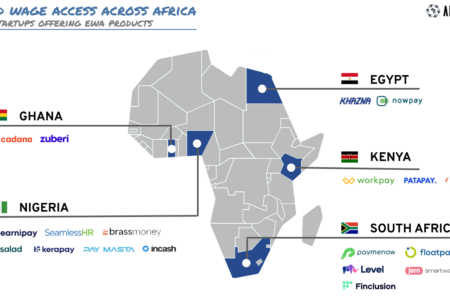The Afridigest Thought Circle is a community of founders, CEOs, practitioners & subject-matter experts that comment on the biggest questions in Africa Tech and highlight what’s now and what’s next in their industries. Here, we convened community members to examine the potential of cryptocurrencies & blockchain solutions across Africa. If you should be a part of the Thought Circle community, sign up here.
Blockchain-based solutions are said to be disrupting financial services worldwide. And emerging markets, in particular, are said to be an ideal environment for these new technologies due, among other things, to the relative dearth of legacy systems.
We asked Thought Circle members: With Africa now being one of the world’s fastest-growing markets for cryptocurrency adoption, what do you make of the potential for disruptive blockchain-based solutions in the African context and what do you see as the key drivers? What applications of cryptocurrency & blockchain are you most excited about as they apply to the continent? Do you expect more companies to build out Africa-focused blockchain- and crypto-based capabilities in the coming years, and, if so, what solutions have the most exciting upside?
What are the most exciting applications of cryptocurrencies & blockchain in the African context?

Co-Founder & CEO, Paxful
Africa is teaching us about the true use cases of Bitcoin and the opportunity it presents for greater financial inclusion. There are several factors that contribute to crypto’s mass adoption in Africa — the biggest being the intense drive and business aptitude of the African youth. Other factors also contribute to the continent’s adoption of crypto, including a lack of financial infrastructure, instability and volatility around local currencies, and high transaction costs on financial transfers.
In terms of exciting applications, Africans are using crypto both to satisfy personal finance needs and for entrepreneurial ventures — this includes remittance, e-commerce, payments, wealth preservation, and social good. What’s most exciting to me is seeing users set up side-hustles and their own businesses, which include remittance, as well as import and export enterprises.
Take Joseph Ebuka for example, a Paxful Peer in Nigeria that buys art pieces with Bitcoin. Most of his earnings are in crypto and it’s more convenient for him to pay for goods and services with Bitcoin. Stories like Ebuka’s have global implications for showing how Bitcoin and other cryptocurrencies are becoming a strong financial contender for everyday transactions.
The potential of blockchain is also massive as it impacts contract management, gaming, land registry, supply chain, and logistics tracking. The exciting application to me is the “blockchain of philanthropy” — which speaks to how blockchain will impact social good. Traditional methods of making monetary donations have proved to be problematic as many individuals lack trust and visibility as to where their money goes. The blockchain not only provides complete transparency, but also minimizes the exchange costs and delays associated with traditional banking. I’ve experienced this firsthand through the Built With Bitcoin Foundation, which I co-founded.

Co-Founder & CEO, Helicarrier
Cryptocurrencies and blockchain technologies in general will leapfrog legacy systems because they offer vastly superior experiences and have the potential to eliminate a lot of the traditional challenges like market fragmentation that are commonplace on the continent. As a corollary:
- Platforms are taking advantage of decentralized finance and crypto to make it easier for Africans to hedge against fiat currency devaluation, create crypto-based accounts among many other things.
- Remittance products are leveraging crypto to enable Africans both at home and in the diaspora to move money across borders faster and cheaper than the alternatives.
- Crypto trading and investment tools are providing Africans with unrivaled access to a broad range of digital assets such as tokenized coins and stocks, NFTs, etc.
- Processing payments via blockchain rails is allowing African merchants, and freelancers to get paid without friction from anywhere and anyone in the world.
- Organizations and political outfits are coordinating more efficiently with DAOs, accepting and disbursing crypto donations more transparently in the process.
However despite these encouraging beginnings, at Helicarrier, we are aware that to fully realize the potential of crypto, the underlying infrastructure that will power it must be built. When this is achieved, even more promising opportunities will be uncovered. It’s still day 1!

Founder & CEO, AZA Finance
Blockchain has tremendous potential to transform the African continent in numerous areas. The area most recently making headlines and the one I am most excited about is blockchain-based digital currencies and payment solutions.
Digital currencies solve many disparities of working with major and local currencies, especially relevant for the numerous conversions needed to send money across Africa and the world. Currently, different regulatory guidelines, transactional fees of up to 20%, and lack of payment rails limit the ability of Africa to unlock incredible growth and be seen by the world as a major player in trade and economic development.
This continental disconnect is driving businesses and investors to seek out alternative payment options, including digital currencies. When AZA Finance started as BitPesa in 2013, we initially relied on digital currencies (mainly Bitcoin) to complete payments. Using digital currencies allowed us to overcome infrastructure challenges and offer rapid payments in nearly all African and G20 currencies. We view digital currencies and digital finance as being two sides of the same coin. While we have transitioned to focus more on digital finance and offering currency pairs without needing to always use digital currencies, digital currencies remain an instrumental tool for businesses to facilitate payments in Africa. I am excited to see how more companies and startups, both on the continent and abroad, can use digital currencies to expand their businesses.

Founder & CEO, Adanian Labs
Blockchain has tremendous potential to transform the African continent in numerous areas. The area most recently making headlines and the one I am most excited about is blockchain-based digital currencies and payment solutions.
Digital currencies solve many disparities of working with major and local currencies, especially relevant for the numerous conversions needed to send money across Africa and the world. Currently, different regulatory guidelines, transactional fees of up to 20%, and lack of payment rails limit the ability of Africa to unlock incredible growth and be seen by the world as a major player in trade and economic development.
This continental disconnect is driving businesses and investors to seek out alternative payment options, including digital currencies. When AZA Finance started as BitPesa in 2013, we initially relied on digital currencies (mainly Bitcoin) to complete payments. Using digital currencies allowed us to overcome infrastructure challenges and offer rapid payments in nearly all African and G20 currencies. We view digital currencies and digital finance as being two sides of the same coin. While we have transitioned to focus more on digital finance and offering currency pairs without needing to always use digital currencies, digital currencies remain an instrumental tool for businesses to facilitate payments in Africa. I am excited to see how more companies and startups, both on the continent and abroad, can use digital currencies to expand their businesses.

Founder & CEO, BitMama
Currently, across Africa, one of the easiest areas for blockchain to fully maximize its disruptive potential is the finance sector. There is a great need for equitable redistribution of wealth, wealth transfer, and the building of wealth. There is also the need to have access to financial freedom. Blockchain-powered solutions can solve the need for financial freedom and wealth transfer across Africa, and it’s why cryptocurrency, one of the use cases of blockchain, is very much celebrated in Africa.
Personally, P2P transactions, Decentralized Finance (DeFi), and Non Fungible Tokens (NFTs) are among the use cases of cryptocurrency & blockchain that I’m most excited about in the African context.
- P2P cryptocurrency transactions transfer the control of money from the hands of traditional institutions like banks to the people, who can decide with whom they want to transact and their preferred buy or sell rates.
- Decentralized Finance broadens the scope of what users can get from the blockchain, giving them access to lending, staking and insurance, covering the entire spectrum of finance.
- And NFTs give users the ability to create digital collectibles that express different aspects of their lives, ranging from identities, real estate, art, music and even games. With NFTs, the original creator gets royalties for her creation, creating a new avenue for wealth building & financial freedom — one can’t ignore that the potential this holds for Africa is unlimited.
No one wants to be left behind, therefore more companies will build Africa-focused blockchain and crypto-based capabilities. However, most of the initial solutions will likely be crypto and finance-based. I am looking forward to a world where cross-border intra-Africa trade and travel becomes easier and faster, and blockchain solutions have a role to play here.

Founder & CEO, Yellow Card
Crypto is African.
The adoption on the continent is being driven by crypto’s ability to solve real problems that people across the continent face every day. That’s why you see such fast-paced growth of the industry in countries like Nigeria, South Africa, and more.
The reason we’re most excited about what we’re doing is because we’re bringing people into this space. It isn’t always easy to access Bitcoin in the first place and enter the crypto space for people in Ghana or Uganda, for example. We’re providing people that access to start their journey in the industry and find incredible projects and solutions.

Founder & CEO, Fonbnk
SPONSORED HIGHLIGHT
First, it’s revealing to recall how telecommunications infrastructure across the African continent leapfrogged many generations of a similar investment in developed economies because there was no legacy infrastructure prior. And as a result, many Africans had better wireless communications for a time before many Western Nations. The blockchain is a new version of this opportunity taking shape, except it’s directly in the hands of consumers.
That said, in my view, the most exciting applications of cryptocurrency & blockchain in the African context include but are not limited to NFTs and DeFi:
- Non-Fungible Tokens (or NFTs as they are commonly referred to) are unique and non-interchangeable units of data stored on a digital ledger. NFTs can be used to represent easily-reproducible items such as photos, videos, audio, and other types of digital files as unique items, with blockchain technology used to establish a verified and public proof of ownership. With regards to Africa, I believe they represent a significant opportunity for a new generation of content creators to directly engage and monetize their creations with fans and consumers.
- Decentralized Finance or DeFi is comparable in that it is enabling Africans to leapfrog legacy banking and financial rails for transfer of value, not just money. Obviously, there are many bottlenecks across the global financial system especially as it relates to Africa, but with the use of blockchain and the use of DeFi, many opportunities are now broadly available to anyone in Africa with a smartphone: payment, savings, investment, and more with no friction.
I think the challenge for both NFT and DeFi adoption across Africa is how they are or how they will be simplified for market adoption. For example, could they be incorporated into existing ecosystems like airtime credit sales which nearly everyone is familiar with?
It’s again revealing to look to history and recall that over 100 years ago in New York City, the Goldman and the Sachs brothers turned a small venture trading garment receivables into a global financial powerhouse. Fast forward 100 years, why can’t a few Africans do the same in the next century trading something as simple as airtime credit on the blockchain?

Co-Founder & CEO, Bitnob
I’m most excited about applications that enable streaming payments.
Think of a situation where, using my phone in Uyo, Nigeria, I’m playing a game where the points I earned are streamed to my Bitcoin wallet. Or what if instead of waiting for payday, I can be paid by the hour? Or what if as a content creator, I can be paid in real-time while my content is being consumed?
I believe technology that makes streaming payments possible will have a massive impact on so many business use cases in Africa.
And in terms of my future expectations, I do expect to see more Africa-focused services built on blockchains — a lot of the existing blockchains already have most of the tools we need to solve our problems today, we just need to build layers on them that make it easy for everyone to use.

General Manager for Africa, Luno
Africa is one of, if not the most promising region for the adoption of blockchain technologies such as cryptocurrencies due to its unique combination of economic and demographic trends. It’s a continent with a number of challenges including high inflation rates, volatile currencies, and a lack of banking infrastructure, and cryptocurrencies can provide an ideal antidote to these issues.
When you also consider that Africa has a young, mobile-native population that is open to exploring beyond the tried and tested ways of the current financial system, it’s clear that there’s an opportunity for new solutions such as blockchain. However, the continent still undoubtedly requires significant investment in crypto-specific infrastructure as well as its internet and electricity networks, but should more progress continue to be made in these areas, cryptocurrencies could definitely become the gateway to a new and better lease of life on the continent.
And one of the main areas holding huge potential for blockchain & cryptocurrencies across Africa is cross-border payments. According to Luno’s Future of Money report, more than half of Nigerians and South Africans said it took them more than a day to receive funds when they were transferred to them. This statistic is a cause for concern, especially when you consider its impact on two of Africa’s largest economies and most dynamic business hubs.
However, with one global ledger system that synchronizes across the entire internet, the blockchain which underpins cryptocurrencies could provide the secure, instant and nearly-free option that cross-border payments need to thrive. The decentralized nature of the technology means not only that everyone can access the same ledger account in real-time no matter who or where they are, but also that money can easily be transferred between parties without all the lag times and exorbitant fees.
Equally, blockchain could play a huge role in transforming financial inclusion across the continent, especially in the informal economy. Although some studies estimate this sector contains over $1tn in wealth, the traditional banking industry has struggled to serve the informal economy for decades due to its prohibitive cost structure, leaving many informal businesses with cash as the main medium of exchange. This is limiting a huge section of the economy to trading within their immediate circles.
However, as a decentralized platform open for anyone to use, blockchain technology not only offers lower barriers and a more inclusive system, but also makes it economically viable to onboard this section of the economy. Offering access to a new segment of customers could not only enhance the growth of these businesses directly, but could also act as a major boost to the economies of their residing countries.
Finally, in addition to cross-border payments, one of the largest opportunities for new crypto solutions is addressing Africa’s lack of internet connectivity. With more than half of the continent’s population still lacking internet access, initiatives like Blockstream and GoTenna’s partnership (which enables bitcoin transactions between users without internet access) could offer major upside. As they scale, these innovations could deliver new access to a majorly underserved customer base and mark a huge advancement in financial inclusion on the continent.

Co-Founder & CEO, Afriex
The potential for blockchain based solutions has only scratched the surface when it comes to the African continent.
Leveraging Africa’s youthful population as key adopters, Blockchain’s use across the continent will definitely continue to expand as more innovators identify how it can be used to solve Africa’s most pressing needs — significant regulatory bottlenecks do exist today however.
The mainstream applications of blockchain technology have largely been finance-focused (remittances, exchanges, DeFi, P2P payments, etc.) but over time it will disrupt other industries across the African continent as the technology has widespread potential for sustainable development in multiple sectors. Key drivers include educating more people on how blockchain works, talent development in blockchain technology (coding), getting more business to accept payments in crypto, etc.
At Afriex, we’re building a digital bank and we’re particularly excited about the commercial and impact upside of various blockchain- and crypto-based solutions for financial services across Africa.





Share: